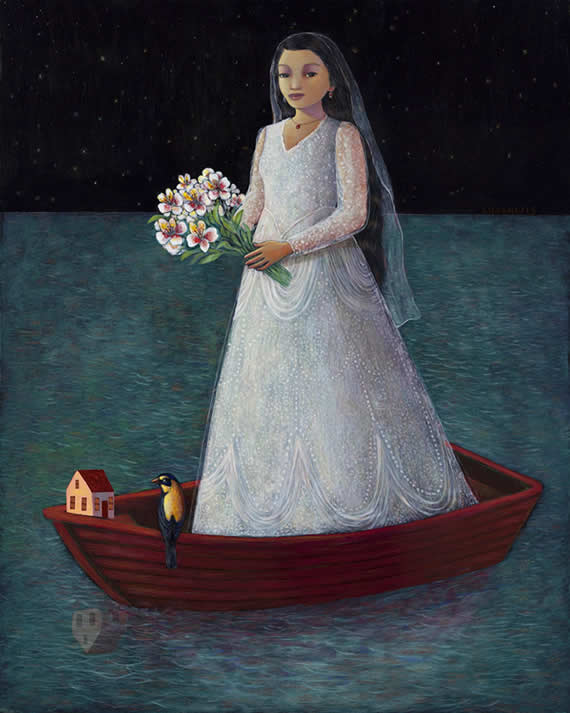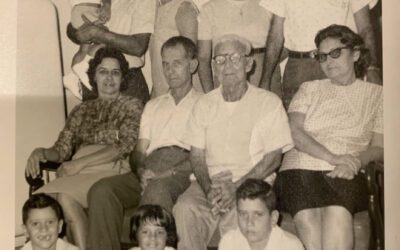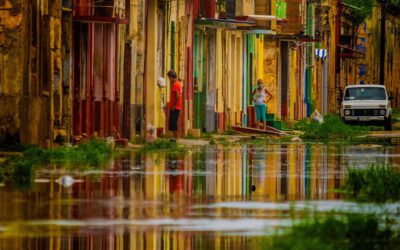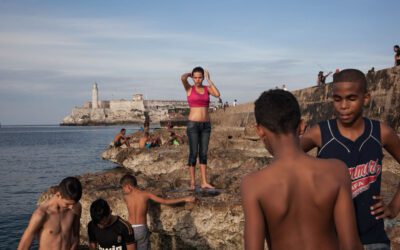Dear friends,
This month we are delighted to feature Chilean-American poet and writer Marjorie Agosín on our blog. The blog is primarily a platform for Cuban voices, but now and then we want to make room for other voices that speak to issues of immigration, exile, loss of home, and the search for home, issues that Cubans share with other Latinas and Latinos, as well as the displaced of many nations around the world. As Cubans now work to heal a rift of more than fifty years, we need to place our experience in a broader context of immigration and ask ourselves what it means to be at home in our globalized society today. Marjorie’s narrative and poem, “The House,” offers a home for all of us who feel homeless at times. “La casa entre el cielo y el agua/The house between the sky and the sea,” the poem begins, and takes us on a journey through the figurative and literal meanings of home with its luxurious, evocative language. We hope you enjoy the journey and look forward to hearing from you.
Abrazos,
Ruth and Richard
by Marjorie Agosin
Read post in Spanish >>
Cuba, for me, has long formed part of both my social and my emotional history. Moisés, my father, a medical research doctor in Chile, worked with Cuban scientists beginning in the 1950s, and he continued this collaborative research into the 1970s. The research carried out at his lab in the University of Chile focused on a wide gamut of tropical diseases and on how those diseases were transmitted by insects found on the island. I remember, and this memory still inspires me, the time he brought me back a beautiful collection of Cuban insects from one of his trips to Havana. I felt so happy with that gift, and especially happy to be perhaps the only girl in Chile who had such a collection.
My father also used to tell me how cheerful Cubans were. He said they had the gifts of laughter and joy. One of my memories is of a visit by the members of a Cuban delegation who improvised a wonderful orchestra from a few spoons and forks. I will never forget that night in Santiago when I felt we were in Havana, creating music.
Social and political history brought enormous changes for us in Chile. My family left Chile and became exiles. I spent my teenage years away from Chile, and then I came to understand more and more what it means to live far from your country. So I felt a lot of affinity with the Cuban people and so many other peoples of the Diaspora. People marked by turbulent political histories.

Bride by Liliana Wilson
This poem, “The House,” has been part of my poetic quest for a long time. I’ve tried to tell in lyric form the story of our ancestral home, my childhood home. I’m the editor of a collection of poems entitled Home, and this poem was born when I began to edit the essays in that collection, written by women who tell us what having to leave home has meant to them. My second motivation was the reopening of diplomatic relations between the USA and Cuba. As I wrote it, I felt that this new beginning would be something extraordinary, opening up possibilities for many other cultural projects in these two countries as they come together now in a fuller, more human way. This poem arose from my deep conviction that we all need a home to shelter our histories.
The House
The house between the sky and the sea,
We called her the wing of the wind.
There we conjured secrets,
Stories shared at night, when silence became song.
Within her I discovered poetry has the face of a river,
And I learned not to fear ghosts,
But to mingle with them in the mist.
The house had blue doors
To scare away evil spirits,
And from within her, at night,
My mother would gaze out at the sea.
The house between the sky and the sea,
The house with a wing of wind.
Within her I penned my first thoughts,
I pressed my face against her stone walls,
I rejoiced in the plenitude of my happiness
In that house where I received my first notebook
In which to record my dreams.
One day we fled our country.
One day we fled our house.
We feared they would demolish her as well.
Existence was so fragile then,
Everything was like broken glass,
And hands were coated in blood.
We were afraid.
Secrets became curses,
Neighbors became informants,
Happiness turned to silence.
I was a girl when we fled.
I shed a tear the size of a rose petal
When we left our house.
We did not close the door,
We did not believe in locks,
But I knew the dead would return to dwell there.
We went to another country.
We learned a foreign language.
We lived in an unfamiliar house
With an enormous kitchen
That lacked the aromas of home…
And the house with the wing of wind
Revisited my dreams.
I waited for her as Penelope
Awaited Ulysses,
Entwined in the wonder of first love.
I always dreamed about her,
And I kept her close like someone safeguarding a secret or a kiss,
That small and munificent house
Where my parents lit fires in the hearth
And regaled us with beguiling stories.
I have lived in other houses
And I have travelled to countless places.
I have loved in other rooms,
But it is in her, in the house with the wing of wind,
Where I return to live and grow old.
It is the house with the wing of the wind, the country of my childhood.
In her, with her blue door,
My memory awaits.
She knows my name,
She wraps me in her wing of wind.
I return to her to discover
Who I was and who I am.
House of sky and sea,
House rich with sounds,
House of rain, house of light,
House where I learned,
Perhaps now, to say farewell.
Translated from the Spanish by Alison Ridley.
Marjorie Agosín is a Chilean poet and human rights activist. She is the author of numerous books of poetry, memoirs, and essays. An award-winning poet, among these distinctions, she is the recipient of the Gabriela Mistral Medal of Honor granted by the Chilean government and the Pura Belpre Award for best young adult novel I Lived in Butterfly Hill given by the American Library Association. She is a professor of Latin American Literature at Wellesley College.







Beautiful!
Could I get the original Spanish poem? I would love to know it!
At the top left of the page you can click on “Spanish” to indicate your preference – it will translate instantly, Diana.
Thanks, Marjorie, for this poem which has given me a glimpse of your house of sky and sea, which feels so uniquely yours and yet so similar to mine. Like you I also have traveled to many countries, lived in multiple houses, and loved in many rooms, and yet every night, before falling sleep I also go back to the house of my childhood, where I smell the fragrance of its patios, the aromas of its kitchen, and walk its empty rooms with those gone so long ago and yet so everlastingly present.
Ruthy, Ricardo: gracias por este poema.
1. Por favor, incluyan el poema en el idioma en que fue escrito. Me encanta la idea de incluir, de vez en cuando, a autores de otras nacionalidades que expresan la separación de la tierra que los vio nacer. Hay tantísimos… tantísimos… creo que se podría convertir–si es que no existe ya–en otro blog…
2. El cuadro de Liliana Wilson es real-mente maravilloso.
3. Ricardo, ¿por qué no has dicho nada hasta ahora en este blog del viaje a Cuba con la delegación norteamericana? Te vi en los reportajes noticiosos.
Siento haberles pedido algo que ya está hecho: los poemas aparecen en español cuando uno abre el blog en español. Please, disregard my request unless, of course, the poem is in French, Creole, etc…
What a beautifully heartfelt poem. It resonated my feelings about my own exile from Iran while living in the U.S. Since 1975.
I still dream my house, our house, in the narrow Firoozeh street in Western Tehran. The Turquoise street. I miss my house. I miss my culture, after 40 years, I still travel in my dreams to Turquoise Street!
Would love to read the Spanish version.. Beautiful. It touched my heart and memories..
Please add me to the email list. The box above failed. “I want more”!!
I would love to see the Spanish version of this please
Marjorie: Gracias por prestarnos tu casa y compartir la nostalgia que sentimos por las que dejamos atras. Saludos
I wanted to thank you for the vulnerability exhibited in this poem. It was absolutely amazing. There was some difficult imagery in the poem of leaving Chile in troublesome political times that are familiar for many. When I read this poem, I particularly thought of my parents who fled from Mexico to escape extreme poverty and raise their children in a land of opportunity. My mother could never return to her home in Mexico after she turned 17 and she still tells me about it in the morning, sitting at the foot of my bed while staring at my poster of Emiliano Zapata. I was raised in a Mexican home inconveniently placed in the United States and I found the opposition disorienting and feel for my mother’s desire for a sense of familiarity she has ached for in the United States for the last 20 years. I have not had the same experiences but I can profoundly relate in many ways to your poem and its striking imagery. Thank you for sharing it.
Though the site is primarily a place for Cuban voices, it is interesting to see the connections to other cultures and nations, in this case to Chile. I loved hearing the story behind the poem’s creation, as it put everything into context. By understanding your relationship with Chile and what leaving there meant, the poem itself could be read through a deeper, more personal lens. This post further links to what I have learned in my ethnic studies courses about the political histories that have led to the displacement of a people. Beautiful story and poem!